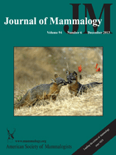
JOURNAL OF MAMMALOGY
Scope & Guideline
Exploring the Depths of Mammal Biology and Ecology
Introduction
Aims and Scopes
- Ecological and Behavioral Studies:
Research focusing on the ecological roles of mammals, their behavior in various environments, and the interactions between species. This includes studies on habitat selection, foraging behavior, and social structures. - Conservation Biology:
Investigations into the conservation status and management of mammalian species, particularly those that are endangered or threatened. This includes assessments of population dynamics, habitat use, and the effects of human activities on mammal populations. - Systematics and Taxonomy:
Research dedicated to the classification and evolutionary relationships of mammals. This includes the description of new species, phylogenetic studies, and genetic assessments to understand biodiversity. - Physiological and Morphological Adaptations:
Studies examining the physiological traits and morphological characteristics of mammals that enable them to adapt to their environments, such as adaptations to climate, diet, and habitat. - Impact of Climate Change:
Research exploring the effects of climate change on mammalian populations, including shifts in distribution, changes in reproductive patterns, and adaptations to changing environmental conditions.
Trending and Emerging
- Urban Ecology:
An increasing focus on how urban environments impact mammalian behavior, ecology, and health, reflecting the growing importance of understanding wildlife in human-dominated landscapes. - Genomic and Molecular Studies:
There is a rising trend in the use of genomic and molecular techniques to study mammalian diversity, population structure, and evolutionary relationships, showcasing advancements in technology and methodology. - Climate Change Impact Studies:
A significant increase in research examining the effects of climate change on mammal populations, including studies on adaptability, habitat shifts, and conservation strategies. - Human-Wildlife Interactions:
Emerging research on the dynamics of human-wildlife interactions, including the effects of anthropogenic activities on mammalian behavior and conservation outcomes. - Conservation Genetics:
A trend towards integrating genetic data into conservation strategies, focusing on maintaining genetic diversity and understanding the implications of genetic variation for species survival.
Declining or Waning
- Traditional Taxonomy:
There has been a noticeable decrease in papers focused solely on traditional taxonomic descriptions without integrating genetic or ecological data, as the field moves towards more integrative approaches. - Behavioral Studies in Captivity:
Research examining mammal behavior in captivity has waned, likely due to a growing interest in wild populations and the ecological implications of behavior in natural settings. - Historical Biogeography:
Papers centered on historical biogeography, while still relevant, appear less frequently as contemporary ecological and evolutionary studies gain prominence, particularly those addressing current environmental challenges.
Similar Journals
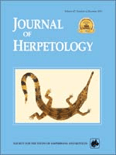
JOURNAL OF HERPETOLOGY
Fostering Knowledge in the World of HerpetofaunaJOURNAL OF HERPETOLOGY, published by the SOCIAL STUDY AMPHIBIANS REPTILES, is a premier platform dedicated to the advancement of knowledge in the field of herpetology, encompassing the study of amphibians and reptiles. With a dedicated ISSN of 0022-1511 and E-ISSN 1937-2418, this esteemed journal has been enriching the scientific community since its inception, with contributions spanning from 1980 to 1983 and from 1985 to 2024. As a notable entry in the Q3 category for both Animal Science and Zoology, as well as Ecology, Evolution, Behavior and Systematics in 2023, it maintains a competitive presence with a Scopus rank in the 40th and 33rd percentiles within its respective fields. Although it does not currently offer Open Access, the journal aims to foster a deeper understanding of the ecological and evolutionary dynamics of herpetofauna, making it an essential resource for researchers, professionals, and students alike. Whether you are exploring conservation strategies or evolutionary patterns, JOURNAL OF HERPETOLOGY remains a vital contributor to ongoing discussions and discoveries in the scientific exploration of reptiles and amphibians.
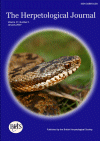
HERPETOLOGICAL JOURNAL
Illuminating the path for future herpetological research.Herpetological Journal, published by the British Herpetological Society, is a prominent platform dedicated to publishing high-quality research in the fields of herpetology, ecology, and conservation. With its ISSN 0268-0130, this journal has established a significant presence in the academic community, especially as it continues its publication journey from 1987 to 2024. Notably, the journal boasts a commendable impact factor, being ranked in the second quartile (Q2) for Animal Science and Zoology, and holds a third quartile (Q3) ranking in other essential categories including Ecological Modeling and Ecology, Evolution, Behavior and Systematics. The Herpetological Journal serves as an indispensable resource for researchers, professionals, and students, fostering the exchange of innovative ideas and insights crucial to the understanding of reptiles and amphibians. Although the journal currently does not offer open access, it remains a vital choice for those invested in the ongoing dialogue around herpetological studies and nature conservation.
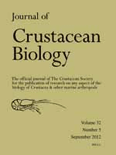
JOURNAL OF CRUSTACEAN BIOLOGY
Pioneering Studies in Crustacean ConservationJOURNAL OF CRUSTACEAN BIOLOGY, published by Oxford University Press, is a premier peer-reviewed journal dedicated to advancing the field of crustacean biology. With an ISSN of 0278-0372 and E-ISSN 1937-240X, this esteemed journal has been a critical platform for the dissemination of research since its inception in 1984, encompassing a diverse array of studies related to the biology, ecology, and conservation of crustaceans. As part of the Aquatic Science category, the journal ranks in the Q3 quartile, illustrating its increasing relevance and impact within the scientific community. Although it is not an open-access journal, the quality of content published here ensures that it is highly regarded among researchers, professionals, and students alike. With annual converged issues until 2024, the JOURNAL OF CRUSTACEAN BIOLOGY remains a vital resource for those interested in crustacean research and its implications for broader ecological studies.

RUSSIAN JOURNAL OF THERIOLOGY
Bridging Disciplines in Zoology and Plant ScienceRUSSIAN JOURNAL OF THERIOLOGY is a prominent academic journal published by KMK SCIENTIFIC PRESS LTD in collaboration with the esteemed Moscow State University. As a dedicated platform for researchers in the fields of Animal Science and Zoology, Ecology, Evolution, Behavior and Systematics, and Plant Science, this journal strives to advance our understanding of terrestrial ecosystems and their inhabitants. Although it currently holds a Q4 ranking and ranks within the lower percentiles of its respective categories, the journal's consistent publishing output since 2011 showcases a commitment to facilitating scientific discourse and collaboration. Addressed to a diverse audience of researchers, professionals, and students, RUSSIAN JOURNAL OF THERIOLOGY serves as an essential resource for disseminating valuable insights and fostering future advancements in the biological sciences.

RUSSIAN JOURNAL OF HERPETOLOGY
Championing High-Quality Research in HerpetologyRUSSIAN JOURNAL OF HERPETOLOGY is a prominent scholarly publication dedicated to the field of herpetology, focusing on the study of reptiles and amphibians. Published by FOLIUM PUBL CO in the Russian Federation, this journal aims to foster the exchange of knowledge and research in animal science, ecology, evolution, and behavior. With its ISSN 1026-2296 and a significant commitment to high-quality academic discourse, the journal maintains a respectable standing within the Q3 quartile in both Animal Science and Zoology, as well as in Ecology, Evolution, Behavior, and Systematics. This attributes to its Scopus rank among leading journals in related fields, enhancing its visibility and influence. Spanning from 2014 through 2024, it publishes rigorous research that explores the diversity, biology, and conservation of herpetofauna, making it a vital resource for researchers, professionals, and students alike who are invested in the ecological and evolutionary dynamics of these species.
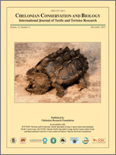
CHELONIAN CONSERVATION AND BIOLOGY
Empowering research to protect our shelled companions.Chelonian Conservation and Biology is a distinguished academic journal dedicated to advancing the field of chelonian research, encompassing conservation, ecology, and biology of turtles and tortoises. Published by Allen Press Inc in the United States, this journal is well-regarded within the realm of Animal Science and Zoology, as well as Ecology, Evolution, Behavior and Systematics, holding a commendable Q3 ranking in both categories for 2023. With an ISSN of 1071-8443 and an E-ISSN of 1943-3956, the journal features a diverse range of articles aimed at professionals, researchers, and students, fostering an understanding of the critical challenges facing chelonians worldwide. Although not an open-access publication, Chelonian Conservation and Biology provides high-quality content, including original research, reviews, and case studies, encouraging engagement and collaboration among experts. With coverage extending from 2006 to 2024, the journal serves as a vital platform for disseminating knowledge and promoting conservation efforts essential to the survival of these remarkable species.
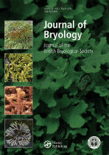
JOURNAL OF BRYOLOGY
Connecting Science and Conservation in BryologyThe JOURNAL OF BRYOLOGY, published by TAYLOR & FRANCIS LTD, is an esteemed academic journal dedicated to the field of bryology, focusing specifically on the study of mosses and liverworts. With an impressive converged publication record from 1972 to 2024, the journal offers a platform for the dissemination of high-quality research that explores ecological, evolutionary, and systematic aspects of these vital plant groups. The journal is recognized within the Q2 quartile in both the Ecology, Evolution, Behavior and Systematics and Plant Science categories, demonstrating its significance in contributing to the scientific community's understanding of plant life. With its notable Scopus Rankings placing it in the top echelons of its field, the JOURNAL OF BRYOLOGY serves as an essential resource for researchers, professionals, and students alike, fostering a deeper appreciation of bryophyte biodiversity and their ecological roles. The journal does not currently offer an open access option, ensuring that subscribers have access to well-curated, rigorously peer-reviewed studies filled with critical insights into flora conservation and environmental sustainability.
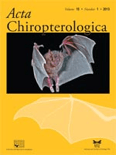
ACTA CHIROPTEROLOGICA
Championing the Study of Bats and Their HabitatsACTA CHIROPTEROLOGICA is a prominent international journal dedicated to the field of bat research, published by the Museum & Institute of Zoology PAS-Polish Academy of Sciences. With its commitment to scholarly excellence, this journal serves as a vital platform for scientists, researchers, and students exploring various aspects of chiropterology, including ecology, behavior, conservation, and taxonomy of bats. The journal has been consistently recognized for its high-quality contributions, holding a commendable Q2 status in the categories of Animal Science and Zoology as of 2023, and ranking #191 out of 490 in Agricultural and Biological Sciences according to Scopus, placing it in the 61st percentile. Although ACTA CHIROPTEROLOGICA does not operate under an open access model, its rigorous peer-review process and focus on innovative research provide invaluable insights and advancements in the understanding of bat biology and conservation. This journal not only bridges the gap between theoretical knowledge and practical applications but also highlights the importance of protecting these key species within our ecosystems. With a history spanning over two decades, from its inception in 1999 to ongoing contributions anticipated through to 2024, ACTA CHIROPTEROLOGICA continues to be an essential reference for anyone invested in the vibrant field of chiropterological research.
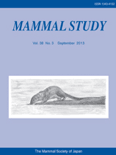
MAMMAL STUDY
Exploring the diverse world of mammals and their ecosystems.Mammal Study, published by the Mammalogical Society of Japan, is a leading academic journal dedicated to the field of mammalogy and related biological sciences. Since its inception, it has provided a critical platform for researchers, professionals, and students to share their findings and insights into the diverse facets of mammalian biology, ecology, and conservation. The journal, with ISSN 1343-4152 and E-ISSN 1348-6160, is recognized for its rigorous peer-review process and has attained a commendable Q3 ranking in the 2023 category of Animal Science and Zoology. With an impact factor reflecting its growing influence—ranking 283 out of 490 in Scopus—we welcome contributions that advance the understanding of mammalian species and their habitats. While access to published articles is through traditional channels, the journal aims to reach an even wider audience by fostering greater awareness and appreciation for mammalian research and conservation efforts. The Mammal Study has converged years of insightful publications from 2008 to 2024, solidifying its position as a vital resource in the biological sciences.
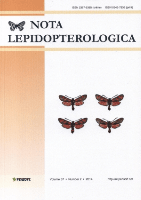
NOTA LEPIDOPTEROLOGICA
Bridging the gap between taxonomy and conservation.NOTA LEPIDOPTEROLOGICA, an esteemed journal published by Pensoft Publishers, has been a cornerstone in the fields of Insect Science, Animal Science, Ecology, and Evolution since its inception in 1995, with a commitment to open access publication since 2014. Based in Sofia, Bulgaria, this journal serves as a vital platform for researchers and professionals alike, facilitating the dissemination of significant findings related to Lepidoptera and broader ecological interactions. With an impressive scope covering vital aspects of biodiversity and taxonomy, NOTA LEPIDOPTEROLOGICA holds a Q3 ranking in its categories according to the 2023 metrics and plays a crucial role in advancing our understanding of insect science. By fostering international collaboration among scholars, the journal not only emphasizes the ecological importance of Lepidoptera but also contributes to global conservation efforts, making it an indispensable resource for students and experienced researchers aiming to deepen their knowledge in these fields.